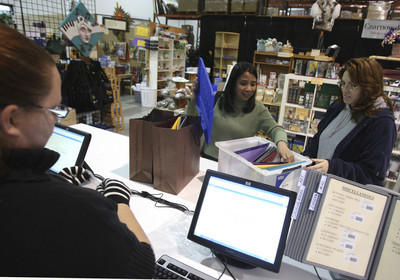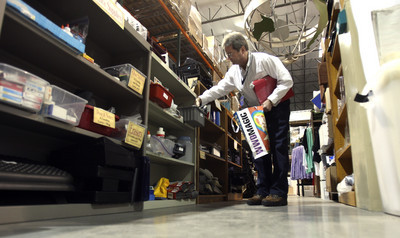Teacher Exchange helps stretch funds
The Teacher Exchange collects donations for resource-deprived teachers in the Clark County School District.
Severe budget cuts in 2009-10 include a proposal to eliminate $200 purchasing cards for teachers. Because of that, the Teacher Exchange -- sponsored by the non-profit Clark County Public Education Foundation -- has become more relevant than ever.
Heather Cyra, who teaches first grade at Gray Elementary School, is planning her first trip to the exchange for arts and crafts supplies. The new teacher at the school south of Sahara Avenue and Torrey Pines Drive estimates that she has spent about $2,000 of her own money on decorating her classroom and buying supplies like markers and plastic containers.
Cyra recognizes that teachers "don't have to go overboard," but the purchasing cards were intended to help with extra expenses. Cyra is sad to see them go.
"It's a bummer," said Cyra, who didn't even get a purchasing card last summer because a slow hiring process caused her to miss a deadline.
The school district was conservative in its hiring last summer because it wanted to avoid layoffs. Because of the ongoing economic crisis, the school district now plans to save $4 million by eliminating the purchasing cards, which work like debit cards.
The loss is hard to contemplate since it's already been difficult to get basics like paper and pens, said Mary Frances Ringstad, a first-grade teacher at Mountain View Elementary School, southeast of Lake Mead and Nellis boulevards.
"It's going to a be real hardship on teachers and students next year," she said.
Because the cards are supplemental and not part of the teacher contract, teachers are not in a position to fight that budget cut, said Ruben Murillo, president of the Clark County Education Association.
As a necessity, teachers have become "very resourceful," Murillo said. "They know where the freebies are."
A visit to the Teacher Exchange is like going to a supersized consignment shop or an overstuffed attic. There are crates of donations from casinos and gift shops on the Strip as well as peculiar contributions from retired teachers, such as a rat skull or a kit to assemble a real feline skeleton.
"Build yourself a pet," said Linda Reese, a retired principal and director of the Teacher Exchange, 3165 W. Sunset Road, which occupies the southeast corner of the Czarnowski Exhibit Services warehouse.
Odd donations are much appreciated. Teachers will use floor-tile samples to show preschoolers how to make patterns or turn a sun visor for the car windshield into a butterfly display.
"This is a time when people need all the help they can get," Reese said. "There are teachers buying paper out of their pockets, paper, for heaven sake."
Teachers often give until it hurts, she said. Reese once a knew a homeless teacher who rode the bus to work. "When he was in that position, he was still buying things for the kids in the classroom," Reese said. "That's the way teachers are."
Ashlee Rickard, an early childhood education teacher, said that at the exchange, she has found "things you would otherwise have to buy in a store," such as paper, fabric and dress-up clothes.
Rickard became a volunteer at the Teacher Exchange because she likes meeting colleagues and brainstorming for new uses for donations. "I like to give teachers ideas they may not have thought of," she said.
Teachers can shop there for free once a month. They are entitled to 200 store credits per visit and can purchase 500 additional credits for a $20 donation.
Each item has a price tag, but as Reese explained, it's difficult to assign a value to a credit.
"A dollar is not equivalent to a credit at all," she said. "The only way you can get a feel is to walk around. A very nice desk goes for 120 credits, but that's pretty close to free, frankly."
Donations to the Teacher Exchange are tax deductible. Reese said the Teacher Exchange has become a convenient option for businesses that don't know what to do with leftovers.
"A great deal of (donations) come from conventions," Reese said. "When they finish up, they find themselves with 2,000 lanyards, 1,000 tote bags, whatever."
When she was principal at Antonello Elementary School in North Las Vegas, Reese found a use for 900 lanyards. They helped her school comply with a new state law requiring all elementary school children to take recess before lunch. Without the lanyards, students would inevitably have lost their prepaid lunch cards on the school playground, she said.
Murillo appreciates the donations but at the same time believes their existence points to a sad reality.
"These resources should already be provided," Murillo said.
Contact reporter James Haug at jhaug@reviewjournal.com or 702-799-2922.


















